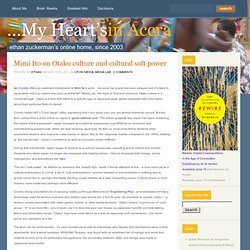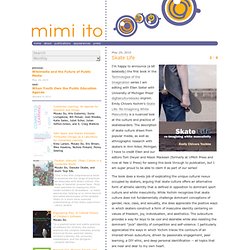

2013 1/2. 2012 2/2. 2012 1/2. Deep change in tech and economy. The Shadow Superpower - By Robert Neuwirth. With only a mobile phone and a promise of money from his uncle, David Obi did something the Nigerian government has been trying to do for decades: He figured out how to bring electricity to the masses in Africa's most populous country.

It wasn't a matter of technology. David is not an inventor or an engineer, and his insights into his country's electrical problems had nothing to do with fancy photovoltaics or turbines to harness the harmattan or any other alternative sources of energy. Instead, 7,000 miles from home, using a language he could hardly speak, he did what traders have always done: made a deal.
He contracted with a Chinese firm near Guangzhou to produce small diesel-powered generators under his uncle's brand name, Aakoo, and shipped them home to Nigeria, where power is often scarce. David's deal, struck four years ago, was not massive -- but it made a solid profit and put him on a strong footing for success as a transnational merchant.
I like the phrase. We should be too. Free Markets vs. Flea Markets. Mimi Ito on Otaku culture and cultural soft power. Posted by Ethan on Nov 16th, 2011 in CFCM, Media, Media Lab | 2 comments Ian Condry offers an extended introduction to Mimi Ito’s work… because her plane has been delayed and it’s likely to be another half hour before she joins us at the MIT Media Lab.

Her topic is “Fandom unbound: Otaku culture in a connected age”. Otaku is a term that refers to a specific type of Japanese geek, geeks obsessed with information about their particular field of interest. Condry heads MIT’s “Cool Japan” effort, explaining that if you study cool, you are almost inherently uncool. But the term comes from a 2002 article on Japan’s “gross national cool“. During that lost decade, Japan began to ascend as a cultural superpower, exporting anime culture and cinema. This isn’t “soft power”, as defined by someone like Joseph Nye. The term can be controversial – it’s used sometimes to refer to individuals who literally shut themselves away in their apartments. The specialization of parts of Tokyo is also significant. Mimi Ito - Weblog: Skate Life. The book does a lovely job of explicating the unique cultural nexus occupied by skaters, arguing that skate culture offers an alternative form of athletic identity that is defined in opposition to dominant sport culture and white masculinity.

While Yochim recognizes that skate culture does not fundamentally challenge dominant conceptions of gender, race, class, and sexuality, she does appreciate the positive ways in which skaters construct a form of masculine identity centering on values of freedom, joy, individualism, and aesthetics. The subculture provides a way for boys to be cool and desirable while also resisting the dominant "jock" identity of competition and self-violence. I particularly appreciated the ways in which Yochim traces the contours of an interest-driven subculture, driven by passionate engagement, peer learning, a DIY ethic, and deep personal identification -- all topics that are near and dear to my own heart.